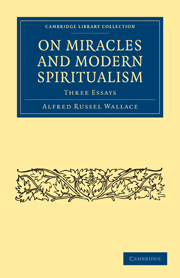Book contents
- Frontmatter
- Contents
- Dedication
- PREFACE
- I AN ANSWER TO THE ARGUMENTS OF HUME, LECKY, AND OTHERS AGAINST MIRACLES
- II THE SCIENTIFIC ASPECT OF THE SUPERNATURAL—
- 1 Introductory
- 2 Miracles and Modern Science
- 3 Modern Miracles viewed as Natural Phenomena
- 4 Od-Force, Animal Magnetism, and Clairvoyance
- 5 The Evidence of the Reality of, Apparitions
- 6 Modern Spiritualism: Evidence of Men of Science
- 7 Evidence of Literary and Professional Men to the Facts of Modern Spiritualism
- 8 The Theory of Spiritualism
- 9 The Moral Teachings of Spiritualism
- 10 Notes of Personal Evidence
- III A DEFENCE OF MODERN SPIRITUALISM
- APPENDIX
- INDEX
2 - Miracles and Modern Science
Published online by Cambridge University Press: 29 August 2010
- Frontmatter
- Contents
- Dedication
- PREFACE
- I AN ANSWER TO THE ARGUMENTS OF HUME, LECKY, AND OTHERS AGAINST MIRACLES
- II THE SCIENTIFIC ASPECT OF THE SUPERNATURAL—
- 1 Introductory
- 2 Miracles and Modern Science
- 3 Modern Miracles viewed as Natural Phenomena
- 4 Od-Force, Animal Magnetism, and Clairvoyance
- 5 The Evidence of the Reality of, Apparitions
- 6 Modern Spiritualism: Evidence of Men of Science
- 7 Evidence of Literary and Professional Men to the Facts of Modern Spiritualism
- 8 The Theory of Spiritualism
- 9 The Moral Teachings of Spiritualism
- 10 Notes of Personal Evidence
- III A DEFENCE OF MODERN SPIRITUALISM
- APPENDIX
- INDEX
Summary
A miracle is generally defined to be a violation or suspension of a law of nature, and as the laws of nature are the most complete expression of the accumulated experiences of the human race, Hume was of opinion that no amount of human testimony could prove a miracle. Strauss bases the whole argument of his elaborate work on the same ground, that no amount of testimony coming to us through the depth of eighteen centuries can prove that those laws were ever subverted, which the unanimous experience of men now shows to be invariable. Modern science has placed this argument on a wider basis, by showing the interdependence of all these laws, and by rendering it inconceivable that force and motion, any more than matter, can be absolutely originated or destroyed. Prof. Tyndall in his recent paper on The Constitution of the Universe in the Fortnightly Review, says, “A miracle is strictly defined as an invasion of the law of the conservation of energy. To create or annihilate matter would be deemed on all hands a miracle; the creation or annihilation of energy would be equally a miracle to those who understand the principle of conservation.” Mr. Lecky in his great work on “Rationalism” shows us that during the last two or three centuries, there has been a continually increasing disposition to adopt secular rather than theological views, in history, politics, and science.
- Type
- Chapter
- Information
- On Miracles and Modern SpiritualismThree Essays, pp. 35 - 43Publisher: Cambridge University PressPrint publication year: 2009First published in: 1875

